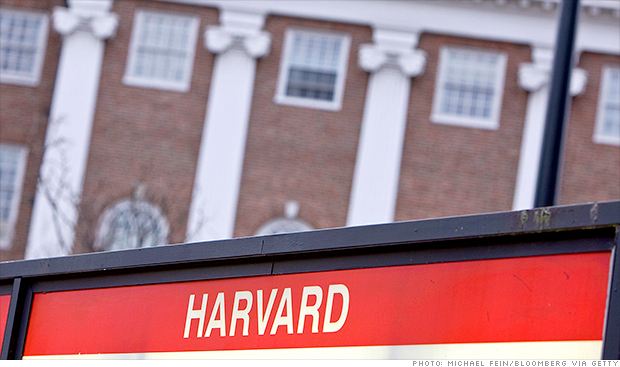 Harvard said it's facing a challenging economic climate.
Harvard said it's facing a challenging economic climate.Harvard University's deficit grew fourfold in the past year.
The number skyrocketed to $34 million in the 2013 fiscal year, compared to last year's $7.9 million shortfall, according to a report released by the university Friday night.The report placed some blame on the "chilling" impacts of cuts in the federal budget on research grants. At the same time, salaries, wages and benefits, which represents half of the university's operating expense, also increased.
Related: Yale beats Harvard on endowment returns
Another big cost for the university is servicing its $5.7 billion debt, which the report said it was working to reduce.
"Colleges and universities around the country continue to face substantial pressure, and Harvard is no exception," Harvard's chief financial officer Daniel Shore and treasurer James Rothenberg wrote in the report.
The report said that though it has grown, the deficit was "manageable," because it's less than 1% of the school's revenue, which totaled $4.2 billion.
While the university did face these cost and economic hurdles, the university endowment's 11.3% positive investment return and a 17% uptick in the amount of donations to the school did help boost revenue. About a fifth of Harvard's revenue comes from student tuition.
The university warned it will face "increasingly complicated yet unavoidable choices" as it deal with the deficit in coming years.
Though it didn't provide specifics on how it plans to tackle the issue, Harvard said it will reduce duplication of work with the help of technology and might also tweak benefits it pays out. The report notes that these changes will be felt at a "personal level," but they are inevitable and necessary.
The good news is that donations to the university continue to grow -- increasing 17% in the latest year to $339 million. Harvard's endowment of $32.7 billion, the largest in the country, also earned an investment return of 11.3%.
However, a Fortune analysis found that Harvard's was the worst investment returns among any of its peers over the past five years.
Harvard isn't the only top-tiered school with a money problem. Its top rival, Yale, also reported a $39 million deficit.
The social media IPO boom of the past two years has been exciting, especially given that the tech IPO market had been essentially frozen since Google's (GOOG, Fortune 500)2004 debut.
But what made this spate of offerings truly unique was that companies like Facebook and Twitter drew mainstream attention to Wall Street. Users of these and other social media services wondered if they should put their money where their mouth is and buy the stocks.
Twitter (TWTR) was the last tech IPO that's likely to incite that kind of mass interest anytime soon.
Instead, nearly all of the rumored upcoming tech IPOs are companies whose main customers are businesses.
File-sharing services Box and Dropbox, customer relationship software maker SugarCRM, green-tech firm Opower and marketing software firm HubSpot are some private companies that experts believe could go public soon. But none of them have actually filed for an initial public offering as of yet.
These companies are important -- and in some cases have better business models than social-media firms. But none are household names that will elicit breathless excitement from Main Street.
"When it comes down to it, how many technology companies really are well known names to consumers?" said Kathleen Smith, principal at IPO fund manager Renaissance Capital. "Most true tech -- not like Facebook, which is essentially an advertising company -- is about the back-end technology that consumers don't know about. Those will never be household names."
That may be a good thing for these corporate-focused companies, given that widespread interest adds a different dynamic to the IPO process -- and it isn't always in a positive way. The widespread attention for social media stocks has some wondering if that corner of the tech market is in a bubble that rivals the early 2000s.
Plus, the increased scrutiny from investors has also led to volatile price swings for Facebook (FB, Fortune 500), Groupon (GRPN) and Zynga (ZNGA) since their market debuts.
But there is one notable, partly-consumer-focused tech company that could generate a lot of attention: Square, a payments startup from Twitter co-founder Jack Dorsey. Reports surfaced last week that Square has discussed a 2014 IPO with bankers.
While rumors of IPOs from a handful of other consumer tech names are also swirling around, they may be fueled more by wishful thinking rather than actual plans for an upcoming offering.
Social image-collection site Pinterest is busy raising money at a valuation of nearly $4 billion, but the company isn't making money yet. Pinterest only began experimenting with ads on the site last month, a sign that the company is at the very beginning of figuring out a business model.
Pinterest's CEO has continually denied rumors of an impending IPO, as have executives from apartment-rental site Airbnb, notetaking service Evernote and taxi-hailing app Uber. But these firms could simply be playing coy, given that they're growing rapidly in a market that's eager for more consumer tech IPOs.

No comments:
Post a Comment